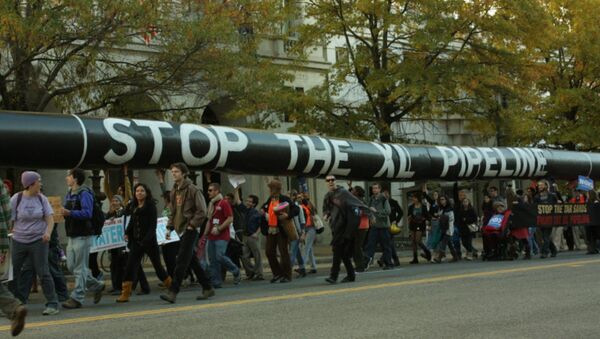In May it was revealed that the US Federal Bureau of investigation violated its own protocols by spying on the activists, who oppose the construction of the Keystone XL Pipeline.
The investigation was closed a year ago, but activists say they are still feeling the effects, and are worried that the watchful eye of the government will follow them the rest of their lives.
Under the agency's guidelines, the FBI should not get involved in sensitive political issues. However, FBI agents violated this rule by failing to get approval before opening files on activists and closely monitoring them thereafter.
The FBI investigation, led out of its Houston field office, targeted the group known as Tar Sands Blockade. The Bureau collected information about upcoming protests, cultivated informants and gathered data about some activists, the documents reveal. The activists were also labelled "environmental extremists," according to internal agency documents obtained by the Guardian and Earth Island Journal via a Freedom of Information Act (FOIA) request.
In August 2013, it was discovered that the investigation into anti-Keystone XL activists had been opened in "substantial non-compliance" with US Justice Department guidelines, and in June 2014 the investigation was closed.
But activists say their tracking by the government lasted even after that closure, the Guardian reports. Some of the activists later had FBI "Subject" files opened on them. Those files in the Bureau's Guardian Threat Tracking System — which can be searched by all FBI employees, can be opened and maintained even if the initial investigation led to no evidence of wrong-doing or criminal activity.
— no hillary, please (@onekade) June 8, 2015
In December 2014, for example, 25-year-old Bradley Stroot learned he was on a watchlist for domestic flights — or a "Secondary Security Screening Selection" — when he was at Chicago's O'Hare airport on his way back from a trip to Texas.
He noticed an "SSSS" designation on his boarding pass and was pulled out of the security screening line for extra scrutiny including more invasive pat-downs and baggage searches.
"They pull you out of line, swab down all of your shit with tongue depressor-like things, and check for bomb-making materials," Stroot told the Guardian.
In an incident in the spring of 2013, Stroot also said his car was thoroughly searched for "bomb-making materials" after police ran his ID while questioning him about sleeping in a car, another indication that he was on a watchlist.
Independent journalist Elizabeth Acre, 27, says that after she was arrested while documenting a tree sit-in she was searched thoroughly at a crossing into Canada in April 2013, and at a second crossing in August 2014 was prevented from entering entirely because she and her friends "seemed like protesters."
Andrew Neef, 31, was arrested at a protest in Houston and the offices of TransCanada, the company constructing the pipeline. His parents — whose Indiana address he had used as his permanent address while between residences — then received a visit from the FBI's local joint terrorism task force, who proceeded to question them about his activities.
"They wanted me to contact them," Neef said, "and probably become some kind of snitch."
The Tar Sands Blockade group was committed to peaceful protests and participated in actions that would sometimes result in minor infractions of the law, like trespassing, for example. The investigation was ultimately closed due to a "lack of reporting and/or extremist activity."




